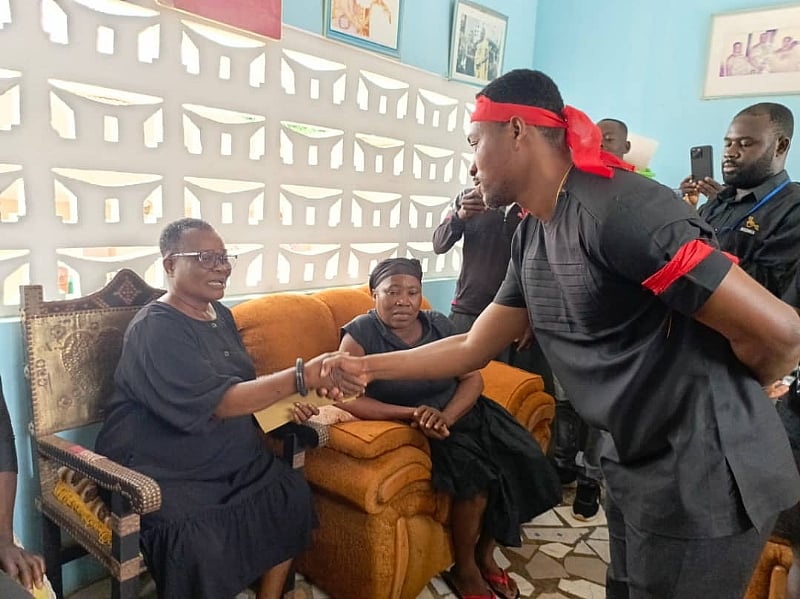A group known as the Concerned Youth of Kwahu in Ghana’s Eastern Region has taken significant steps to address a scandal involving Daasebre Akuamoah Agyapong II, the Kwahumanhene, who has been accused of extortion and fraud. The allegations have led to his resignation from the position of Board Chairman of the Agricultural Development Bank (ADB). The group asserts that his conduct at ADB has severely damaged the reputation of the Kwahu stool, prompting them to petition the Kwahu Traditional Council to initiate the process for his destoolment. The scandal revolves around allegations that Daasebre extorted GHC 2,406,000.00 from a customer and has raised concerns regarding the integrity of traditional leadership in the area.
Following the scandal, Daasebre Akuamoah Agyapong II resigned from his position on Friday, citing the need to protect the institution’s image amidst rising controversy. According to the Bank of Ghana, his continued role had become untenable as it threatened the bank’s reputation. The situation escalated into public dissent; hundreds of young people from Kwahu organized a peace march to express their grievances and petition traditional leaders for immediate action. They reached out to the Paramount Queen Mother and the Kwahu Adontenhene, making their discontent known regarding the impact of Daasebre’s actions on the chieftaincy’s integrity.
In a petition led by acting chair Mr. Ayim Benjamin, the Concerned Youth articulated their disappointment with the recent events, expressing shock at Daasebre’s actions that have marred the image of Kwahu. They underscored the need for urgent action from the traditional council to uphold the dignity of the chieftaincy institution. The group’s call for decisive measures is positioned as a necessity to restore the honor of Kwahu, as they highlighted their commitment to protect their cultural heritage and the chieftaincy’s sanctity from further disgrace.
The youth’s petition carries a seven-day ultimatum for the traditional leaders to respond to their concerns. The Concerned Youth of Kwahu have warned of possible repercussions should their demands not be met. They indicated their willingness to pursue “other legal and traditional means” to ensure their requests are honored, reflecting a growing sense of urgency and frustration within the community. Their statements reveal a commitment to retain the respect and authority of the kingdom of Kwahu, indicating broader implications of leadership accountability within traditional institutions.
The background of this situation includes a formal complaint by Collins Darkwa Aboagye, CEO of Prabhat Trading Limited, who accused Daasebre of soliciting payments under false pretenses for facilitating a loan approval at ADB. Aboagye claims that in addition to the initial GHC 50,000 demand, he was pressured to pay GHC 2 million, which he alleges remains unpaid despite repeated promises from Daasebre. The alleged misconduct has catalyzed the resignation process and heightened scrutiny on traditional leadership, with the Bank of Ghana describing Daasebre’s actions as significantly damaging to the institution’s image.
In response to the scandal, the Bank of Ghana played a crucial role by formally directing Daasebre Akuamoah Agyapong II to resign due to the reputational harm his conduct had inflicted on ADB. This directive, grounded in the legal framework of the Banks and Specialised Deposit-Taking Institutions Act, illustrates an institutional effort to uphold standards of integrity in banking and leadership. The unfolding events have sparked a broader conversation regarding the respect and accountability expected from traditional authorities, particularly in light of allegations that could undermine public confidence in both chieftaincy and banking sectors.
The Concerned Youth of Kwahu’s actions mark a significant moment of civic engagement where local youth are advocating for a return to proper governance within their traditional structures while seeking justice for perceived injustices. The outcome of this situation not only holds implications for Daasebre’s future but also reflects the expectations of the Kwahu community in terms of responsible leadership and moral accountability. As the deadline for the traditional leaders to respond approaches, the community is left awaiting the decisions that may redefine their leadership and restore faith in their chieftaincy system.














